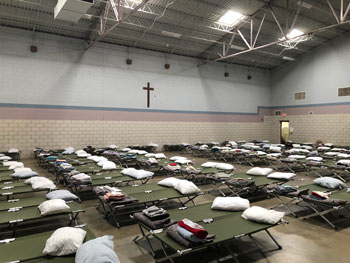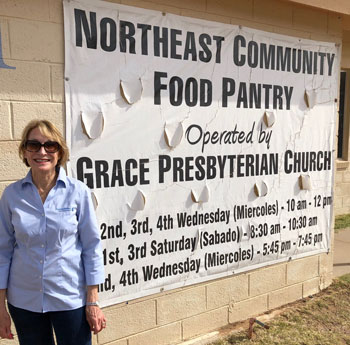El Paso is located at the far western point of Texas in the Chihuahuan Desert, separated from Juarez, Mexico by the Rio GrandeRiver. The Franklin Mountains — the southern tip of the Rockies — divide the city. El Paso is home to almost 700,000 people, the University of Texas at El Paso (UTEP), and six PC(USA) churches, all belonging to the Presbytery of Tres Rios.
My husband, Andy, and I traveled to El Paso on March 31 to see firsthand the situation at this border, where close to 1,000 migrants from Central America seek asylum in the United States each day. We were called to seek opportunities to volunteer in two church sponsored programs. Bob Hedicke, an elder at Grace Presbyterian Church, arranged for us to work at Blessed Sacrament Catholic Church on Monday and Tuesday, and at Tobin Park Methodist Church on Thursday and Friday.
Reporting for duty
We reported to Blessed Sacrament as instructed, where Berta, an elderly member of the parish, told us she was waiting to welcome her brothers and sisters. This church’s welcome center, which can accommodate up to 45 people, was once a convent. The chapel and the nuns’ sleeping quarters have been converted to bedrooms, with as many cots as each room can comfortably hold. Each cot has a set of worn but clean sheets and a towel and washcloth waiting. Most of the rooms have a small semi-private bathroom. Showers are at the end of the hall.
A tray of sandwiches covered with plastic wrap, prepared by volunteers, along with a flat of apples, would be lunch for the migrants when they arrive. We busied ourselves dusting and neatening furniture in the large living room and helping to put together hygiene bags with travel-size toiletries. Senaida, a retired fourth grade teacher, organized donated children’s books and selected several she would read to the children. Angie, a member of the parish, readied the clothes closet.
More volunteers arrived, and about six of us were convened to receive instructions on the welcoming process. We would greet the group as they arrived by bus and invite them into the living room for a short orientation. They would receive room assignments, wash their hands, and eat lunch.
After lunch, their documents would be verified, and they would receive needed over-the-counter medications and hygiene bags. Then they would meet with volunteers who would help them contact their sponsor, typically a family member, and confirm travel arrangements. Some would travel to their new homes by bus and some by plane. Since we had a rental car, we would be able to help with transportation to El Paso International Airport and the Greyhound bus station. Travel arrangements for each family unit would be posted on a whiteboard.
Each person would be invited to choose a travel outfit from the boxes of donated clothes and shoes, and would then receive “la ropa interior,” new underwear. They would then wait their turn for a shower.
The group arrives
The group finally arrived about 1 p.m. There were complete families, single parents with children and youth, and sibling groups. All had crossed into the United States where they could turn themselves in to Immigration and Customs Enforcement (ICE) authorities and request asylum. From there, each adult had undergone a background check, been fitted with an ankle monitor, been given a court date, and released, to be delivered by ICE to Annunciation House or one of the welcome centers El Paso churches have established, such as the one at Blessed Sacrament. They were from Honduras, Guatemala or El Salvador. They were weary. But they were gracious and polite, and very forgiving of my broken Spanish.
The program we had rehearsed went smoothly, and by late afternoon most were resting on their cots or relaxing on the sofas in the living room while their children played with a collection of heavily used donated toys. One little boy wore a safari helmet and pushed a small Barbie car around the room, and a tiny girl brought Andy a super-hero weapon and asked for instruction.
There was a poignant moment during the “shoe shopping” when a pre-teen girl found a beautiful black satin slipper, with a small heel and a bow with rhinestones, that fit her perfectly. Sadly, its mate could not be located, though we all searched for it.
The clothing and shoes for men and boys were often too large, and they were happy to find anything that fit. The women and girls looked carefully through the boxes to find pants and a top to match. One woman found a pair of jeans that fit her perfectly, but we had to cut the seam of one pant leg to fit over her monitor. Those who were traveling north were given sweaters or jackets.
Andy and I left at the end of the day feeling tired, both physically and emotionally, but blessed. We prayed that night for a good night’s sleep and safe travels for each of the migrants.
Day 2: on their way
On our way to the center on Tuesday, we stopped at a Dollar Tree and purchased coloring books and crayons for the children to take with them on the next leg of their journeys. When we arrived at the center, some of the families had already left; others would be leaving throughout the day. Blessed Sacrament only opens its center on Monday and Tuesday. Lulu, the volunteer who was running the hygiene room that day, said she was out of cough drops and children’s allergy medication. Angie was out of men’s socks. So, we made another trip to the Dollar Tree to purchase provisions.
As amazing as the courage and patience of those who are migrating is the generosity of those who are welcoming. The median household income in El Paso is $42,037; the median home price $122,700. These are not wealthy people, yet they volunteer their time and purchase what is needed to help others. Although we avoided discussing politics, it was clear that the citizens of El Paso are on various sides of the immigration issue. But everyone agrees that welcoming and serving is the way we follow Jesus.
Many churches serving together

Tobin Park United Methodist Church in El Paso, Texas, has cots set up in its gym for refugees as they come into the U.S. —Sherry Hester Kenney
Thursday morning, we reported to Tobin Park United Methodist Church, and sorted clothes and food while we waited for a group of migrants to arrive. Tobin Park’s small congregation leases its Christian Life Center to Grace Presbyterian Church, which operates a food pantry there, and also a migrant welcome center. Grace also pays a small stipend for Teresa, a volunteer coordinator, to work Thursdays and Fridays, the two days the center is open. Volunteers here come from many churches: Grace, Tobin Park, Trinity-First UMC, St. Mark UMC, First Mexican Baptist Church, Del Sol Church, University Presbyterian Church and others.
This center is more spacious than the convent, and can accommodate up to 90 persons, with the gym set up as a large sleeping room. But the welcoming process is almost identical to the one we had learned earlier in the week. When they arrived, the migrant families were like the others we had met — tired, polite, and grateful to have arrived at a safe and loving place.
We took several families to the airport that afternoon, but one that stands out for me was a mother and her five-year-old daughter. The girl had not seen her father in three years and was very excited. When we arrived, and Andy went in with them to get boarding passes and accompany them to the security desk, I waved, “Adios, Niña” (Goodbye, Child). She responded, “Adios, Abuela” (Goodbye, Grandmother).
Friday morning Brother Alfonso Lopez, City Outreach Pastor for Del Sol Church, led the migrants in worship before lunch. He invited me to read John 3:16 to open the service, and to pray for the food to end it. Afterwards, he thanked me profusely, as had everyone we met during the week, for our presence there, and for the support of the Presbyterian Church in border ministry in El Paso.
If you go…
El Paso is high desert, very windy at times. Hats, jackets and sunscreen are musts.
We traveled on Southwest Airlines, where bags fly free, so we checked empty suitcases with gently used clothing and shoes to donate. Men’s clothing and shoes in small sizes are especially needed.
Hotel and rental car prices are average in El Paso, but local restaurants serve delicious food at low prices. University Presbyterian Church is a Presbyterian Disaster Volunteer site and is ready and eager to house volunteer groups. To see all volunteer opportunities with PDA, click here. Scroll down to Texas to see information on volunteering with University Pres. To talk to someone about volunteering there, call Eden Roberts at the PDA Call Center at 866-732-6121 or email her at pda.callcenter@pcusa.org.
Take your passport. During the day it is safe, and very interesting, to walk across the bridge for a visit to Ciudad Juarez. I don’t recommend driving, as the lines to get back by car are very long and can take hours.
Financial contributions to support border ministries should be sent to Presbyterian Disaster Assistance’s Disaster Relief-Refugee Emergencies Fund, which you can find here (fund DR000095).
Sherry Hester Kenney is a Ministry Relations Officer with the Presbyterian Foundation, serving the South Central Region. She works with congregations to create a culture of generosity, offers seminars and workshops, develops gifts and fundraising plans for ministries, and provides coaching to finance, stewardship and endowment committees. Sherry is a Certified Financial Planner who also holds the designations of Chartered Life Underwriter and Chartered Financial Consultant. She resides in Denver. You can reach Sherry at sherry.kenney@presbyterianfoundation.org.

